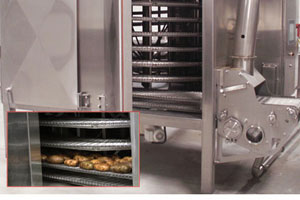Spiral oven bakes potatoes more efficiently


|
|
Intevation’s spiral oven from Unitherm Food Systems is a 16-ft. cube with 350 ft. of belting. The potato application (inset) may be the first of its kind for a spiral oven. Source: Unitherm Food Systems.
|
One of his major concerns in opening a new plant was limiting the floor space required for baking such a wide array of foods. To accomplish this task, he looked at spiral ovens, which are designed to occupy a much smaller footprint than the more traditional, linear oven.
“In the past, every oven we’ve had has been a linear oven, which can be quite long and take up a lot of floor space,” says Arend. His most recent linear oven was a 65-foot converted bakery oven. “By the time you put an entrance into it and an exit out of it, you pretty easily eat up 100 feet of room space.”
According to Arend, to accommodate escalating production demands at his previous enterprise, operations had to resort to placing more layers of potatoes in each basket as it was sent through the linear oven and “turning up the temperature higher and higher.”
“It served the purpose at the time,” explains Arend. “But it didn’t give us the quality of product we have now or the controls we have now. It also wasn’t as energy efficient.”
Furthermore, the linear oven required an employee to add the potatoes into baskets by hand, before pushing each basket into the oven. At that point, the product moved through on a conveyor system, but it cost Intevation additional money for personnel—particularly as production demands increased.
“When we started looking around, we saw Unitherm had equipment that appealed to us, not only because of its capacity and flexibility, but also its controls,” says Arend. “The oven [we chose] is designed so you can control the air and the cooking moisture required for a given recipe. Our spiral oven also provides a variable speed control, according to the chain length and timing. Also, the controls are simple.”
With the spiral oven, potatoes are baked individually. After the potatoes are washed, graded and inspected for quality, they feed automatically in and out of the oven. “Potatoes come in many sizes. They are not uniform products like hamburger patties or sausage links,” explains Arend. The 16-foot spiral oven with 350 feet of belt was customized to meet his specific cooking requirements.
However, the variation in potato size was still an issue and, without adjustment, could result in considerable product waste due to under- or over-cooking. “Although we have a pretty tight specification on the length of the potatoes, they usually vary in diameter,” says Arend. “So, we found out that we could get very specific in our baking based on the profile of the potato in relation to the specific gravity [relative density] and other factors.”
For more information:
Adam Cowherd, 918-367-0197,
unitherm@unithermfoodsystems.com
Looking for a reprint of this article?
From high-res PDFs to custom plaques, order your copy today!








